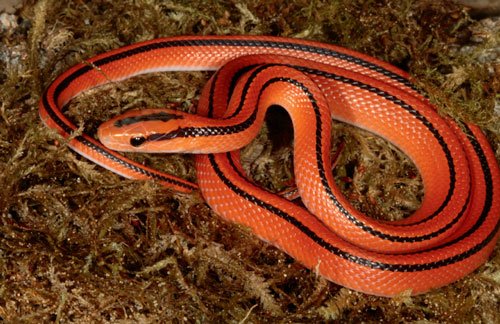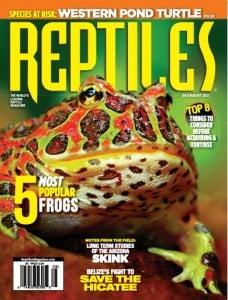Bamboo Rat Snake
Northern Thailand, at 2,000 to 3,000 feet in elevation
Because the bamboo rat snake is not tolerant of heat and does best in a slightly moist environment, captive husbandry of this mountain-dwelling snake differs from what most snake hobbyists are used to providing their pets.
An enclosure measuring 26 inches long by 12 inches wide and 12 inches tall (or comparable) would be large enough for a single or pair of snakes. Of course, the enclosure can be larger if your taste runs that way.
I like cypress bedding for this snake, as it makes it easy to keep the enclosure on the humid side with a gentle misting daily or every other day. Bamboo rat snakes like to burrow, too, and being able to burrow in damp bedding provides them with needed security. You can also use Carefresh bedding, which is a recycled cardboard product used primarily for mammals that I’ve found works well as a substrate for damp and semi-damp habitats. It’s not as natural looking as cypress bedding, though, which I find to be its only drawback.
Provide a water bowl at one end of the enclosure that’s big enough for the snake(s) to drink from and possibly soak in. Lay out a few pieces of cork bark, commercial hides, or anything else you like to serve as a hide or hides.
Place a heating pad under one end of the enclosure. It is very important to remember that bamboo rat snakes are cool-weather snakes, and they don’t do well in temps that are higher than 80 degrees Fahrenheit. I recommend a thermal gradient of about 68 to 70 degrees with a hot spot over the heating pad reaching no more then 77 degrees. Because this snake can’t tolerate high temperatures, when in doubt, keep bamboo rat snakes cooler.
Provide a snug and secure cage top; as with all snakes, bamboo rat snakes will escape their enclosures to go explore your home if given the chance. No lighting is required for the snake’s health, but you may want to place a “cool” light over the enclosure to provide some illumination to help you view your pet in its enclosure. Sticks, branches or other decorations can be used as desired.
Bamboo rat snakes may be fed once a week. Though hatchlings are sometimes difficult to start, sub adults and adult snakes usually take to frozen/thawed or pre-killed mice with no problem. I do recommend, when purchasing any bamboo rat snake, that you try to get one that is already feeding consistently on pre-killed mice. Ask sellers questions when you are thinking of making a purchase, and ask for the snake you’re considering to be fed while you watch, just to be sure.
The bamboo rat snake and its relatives are being produced in captivity in increasing numbers. Imported, wild-caught specimens usually come into the U.S. in bad health and do poorly in captivity; therefore, I advise avoiding field-collected imports. Captive-bred bamboo rat snakes, however, once started on mice, prove to be beautiful, pleasant and long-term pets. This snake’s color is stunning, captive-bred specimens are usually very docile, they remain at a reasonable size and are easy to care for.
You can find captive-bred bamboo rat snakes at reptile shows, over the internet and in specialty reptile stores.
In the wild, bamboo rat snakes spend most of their time underground, coming to the surface early in the morning and late in the afternoon.
The bamboo rat snake makes a great pet. Beauty, a manageable size and ease of handling — it’s all here in one package. I highly recommend this snake.

